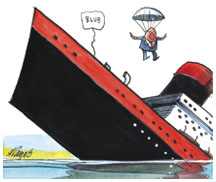
|
Illustration by Henry Payne '84 |
My
life as a director
The story begins
at Chapter 11
By Jeremiah D. Lambert ’55
Jeremiah Lambert ’55 is a lawyer in Washington, D.C.
Two years ago a friend asked me to join the board of Global Crossing, the once high-flying telecom company that had plunged recently into bankruptcy. I would, he said, be one of three new independent directors. I was intrigued, although my law firm was not. To accept, I said goodbye to the life of a big-firm lawyer.
A meteoric success story, Global Crossing had built a 100,000-mile international broadband fiber-optic cable network in a few years, borrowing billions in the process. By late 2001 it had dropped off a cliff, the victim of recession, industry overcapacity, and too much debt. In January 2002 it filed under Chapter 11 – then the fourth-largest bankruptcy ever – spurred by a cash-flow crisis and allegations of financial chicanery. Investigations and class-action shareholder lawsuits followed. Many directors left. New directors would have to investigate a former executive’s whistleblower claims of accounting hype while preserving the company as a going concern.
I had no prior connection with the company and therefore could not be sued for prebankruptcy decisions. Before joining the board, however, I asked about directors and officers insurance coverage, which pays legal-defense costs up-front but is available only at great expense. When the company agreed to buy a one-year policy, the new directors joined the board and reconstituted its depleted committees.
The company’s C.E.O. was determined to avoid liquidation by cutting costs, maintaining revenues, meeting creditors’ financial benchmarks, and attracting a postbankruptcy purchaser for the company as a whole, not its disassembled parts. He looked forward to the company’s emergence from bankruptcy. His plan presupposed creditor and bankruptcy-court approval of a plan of reorganization, conducting an auction, finding a viable purchaser, and surviving regulatory review.
To investigate the whistleblower’s allegations, however, the new directors had to look back – at the company’s accounting for so-called swaps of fiber-optic capacity with other carriers preceding its bankruptcy, and the role played by its outside counsel and accounting firm. As chairman of the investigating committee, I hired a law firm and an industry consultant to investigate whether the capacity transactions had a legitimate business purpose. We also examined the work performed by the company’s professional advisers.
After many months and dollars, we published our report – long awaited by the Securities and Exchange Commission, the company’s creditors, and its former outside law firm. We found that the capacity transactions were not shams, but faulted Global Crossing’s law firm for conflict of interest and inattention to the whistleblower’s charges. The legal press and others seized on this dispute but did not question our findings. While company management may have vaporized billions in shareholder value, suspicions of fraud were unproven.
Less than a year after I joined the board, the company’s founder and chairman stepped down, and I became cochairman of the board. Only five directors remained, and we confronted many difficult problems.
Under a plan of reorganization approved by the bankruptcy court, two Asian investors, one Chinese and the other Singaporean, offered to purchase the company pending a national security review by the Committee on Foreign Investment in the United States (CFIUS), which includes representatives of the Departments of Defense, Justice, and Treasury. In April 2003, however, CFIUS refused to allow the Chinese investor to acquire strategic communication assets in the U.S., and its Singaporean partner was left to make the entire $250 million equity investment alone. That change encouraged other would-be bidders to submit competitive purchase proposals. The board nonetheless voted to extend the company’s purchase agreement with the Singaporean investor — a decision later blessed by the bankruptcy court in response to a corporate raider’s last-ditch legal challenge.
Still, we were not home free. Defense continued to oppose any foreign investment in sensitive U.S. telecommunications assets. The company, meanwhile, was burning cash. A CFIUS turndown would mean liquidation, a prospect that concentrated the collective mind. None too soon, the company acquiesced in a sweeping national security agreement. CFIUS approved, and in September 2003, President Bush did, too. Several months later the company emerged from bankruptcy, much slimmer but still a player in the hypercompetitive international broadband communications market.
There are lessons here for other directors: Be skeptical, as people
often will tell you what they think you want to hear. Cultivate internal
channels of information. Stand by your decisions. Finally, remember that
after your professional advisers have gone home, you still will be hanging
out there, personally liable, with your reputation on the line.
![]()

